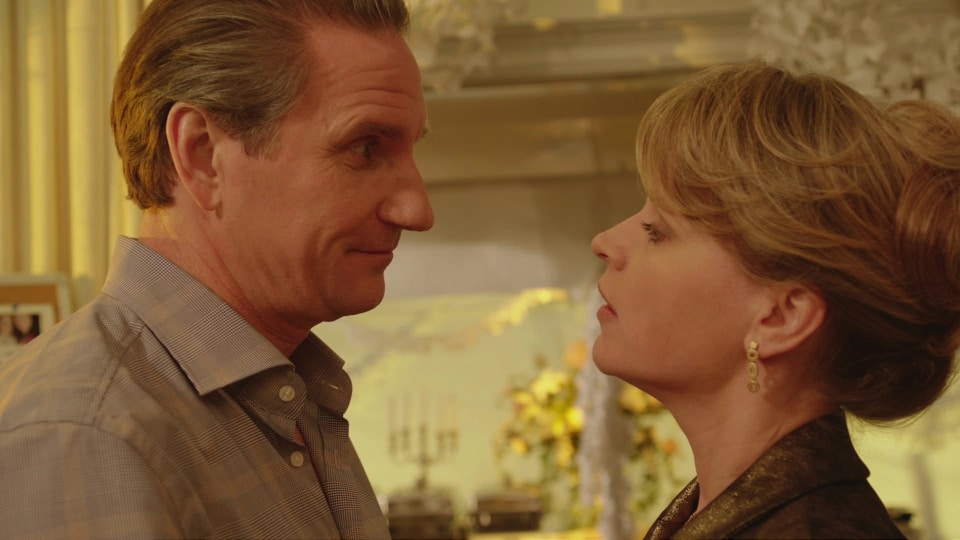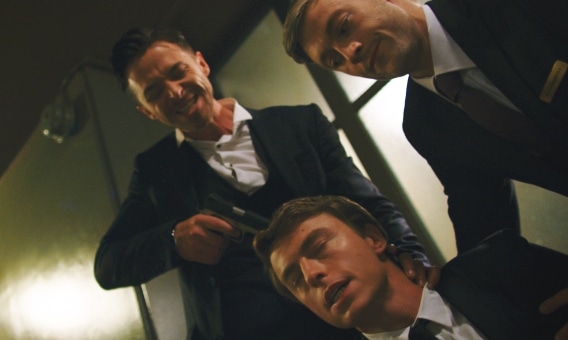"Watch out, behind you! Everyone has wanted to shout that when, in a film, the hero fails to realise that danger is imminent. Now, at last, such a thing is actually possible. That is, Late Shift is the first feature-length cinema film in which we can give clues to the main character, the student Matt forced to cooperate by criminals. Not by shouting, but via an app.
Incidentally, at a preview, yours truly discovered that the consequences are hard to foresee. Do we help the cornered Matt or do we send him from the shore into the ditch? In the Netherlands, this interactive event can be experienced once in six Vue cinemas on Wednesday 21 June.
The interactive film is one where, as a viewer, you can intervene in the course of the story. It is a promise that has long been floating around, but has proved difficult to realise. Nevertheless, audiences at a cinema in New York were already able to experience such a thing once. There, in 1992, the 20-minute interactive film I'm Your Man premiered. The directions were then given to the characters not via an app, but by joysticks mounted in the cinema. Apart from the technology and length, this was already quite similar to what Late Shift now offers.
Interactive complications
That Late Shift now being presented as a first some 25 years later does prove that the concept has quite a few complications. Especially if we want to introduce that interactivity into a more or less traditional feature film. Because actually, the ideal interactive film has long existed, only we call it a computer game. But whereas in a game all the scenes are created 'live' by the computer, for a film all the possibilities have to be recorded in advance. And it doesn't even take that many moments of choice to ensure an explosion of variations.
Yet in recent decades, all sorts of ways have been persistently tried to give viewers a more active role. In 2009, the Imagine Film Festival presented the Canadian interactive production Late Fragment. But there was no real steering of the story in this. However, as a viewer, you could choose which of the characters you wanted to follow. This allowed you to edit the film 'live', so to speak.
The term 'interactive documentary' also crops up from time to time, as in 2010 with the long-running multimedia project Highrise by Canadian director Katerina Cizek. She filmed the lives of apartment dwellers in all kinds of world cities. As a viewer, you can then wander through those residential areas on the website, as it were, and click on where you want to go inside.
Tumbling bodies
Something similar, but as a brilliantly designed fictional quasi-docu, Dutch creative talent Floris Kaayk presented at IDFA last year. In The Modular Body Kaayk convincingly shows that science can already cobble together artificial bodies. But here, too, the so-called interactivity is limited to clicking on short films at will. For real control of events, you quickly approach game-like video installations. For example, the bizarre Meat Puppet Arcade full of tumbling bodies. Also at IDFA last year.
For audiovisual artists, it remains a challenging terrain for all kinds of experimentation. In 2012, for instance, Olivier Otten presented the film Order. A lonely protagonist fills his days with sad walks and waiting for messages from his beloved. As a viewer, you can control who rings his doorbell, or how he eats his breakfast. This is already more close to a true interactive feature film. www.selfcontrolfreak.com/order is the place to play it online.
Paul Verhoeven
In the same year, the Netherlands Film Festival, under the slogan 'grab the director', tackled a spectacular project. A thriller with Tygo Gernandt in which viewers could tweet live directing instructions. An editor made a selection from the countless assignments on the spot. Tygo got those whispered in his ear.

Through similar audience participation, but not live, a year later came the sarcastic adultery comedy Sting game established. Paul Verhoeven contributed wholeheartedly as director. The script was compiled from hundreds of suggestions from enthusiastic participants in the project.
Game fun
And now there is the interactive cinema film Late Shift. A beautifully crafted thriller about a student who has a job as a security guard in a car park. One night there, he falls into the hands of a group of criminals planning a robbery of an auction house. Forced to take part in it, he must then escape with a female accomplice. Will he succeed in finding out who is pulling the strings behind the scenes?
At least, that's how events developed during the preview I witnessed. All tightly filmed and entertaining enough, even if the occasional implausible moment pops up. Such a choice as kissing or not kissing I found a bit childish. It does little to detract from the enjoyment of the play.

In dozens of tense situations, student Matt has to decide spontaneously. Run away or keep quiet, fight back or not, trust a stranger or not, and so on. He does not have to choose himself, because the viewer does that via the app downloaded on the smartphone. That is, Matt follows the choice made by the majority of the audience.
Seven endings
It provides a nice group feeling in the cinema, although it can also be irritating at times when the majority decides differently than you would have liked. So you stay alert while events take an unpredictable direction. So visitors at the six Vue cinemas are likely to see six different films on Wednesday.
Intriguing, and also a little frustrating, is that in the heat of the game it is hardly possible to foresee whether a decision will have major or minor consequences. I estimate that I encountered about 60 choice moments, even though there are only seven different endings programmed in. That feels a little bit like cheating. But since all possibilities have to be filmed in advance, I also understand why the makers had to limit themselves.
So there are probably many choices that produce small variations but don't really affect the ending. I think of the scene where Matt is given the chance to run away. We chose to run, but two seconds later he was already caught in the collar by his criminal escort and still went with him.
Endless trials
Still, you naturally want to know what would have happened if he had not gone to investigate in the beginning when he saw a suspicious figure on the monitor in his car park. After all, there is that choice. Doesn't he then fall into the hands of the wounded robber who forces him to cooperate? After all, I can hardly imagine Late Shift also has a variant in which Matt simply goes home whistling after his night shift. In any case, it is something that makes one curious.
Late Shift plays with the consequences of chance, but to really discover exactly what those consequences are you would have to play the film many times. Very different from, say, Tom Tykwer's hip Lola rennt (1999). In it, you get to see directly how chance can send a dramatic event in three different directions. But there, the viewer couldn't choose anything for himself.
In principle, Late Shift the opportunity to try out all kinds of variations. Unfortunately, this will not be possible in cinemas on 21 June, as it is a one-off experiment there. Fortunately, Late Shift can also be downloaded from iTunes' App Store. Those with enough curiosity and patience can then endlessly explore all the plot's paths. And you don't have to be voted out by the rest of the audience.
